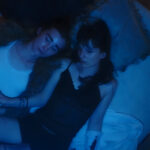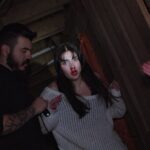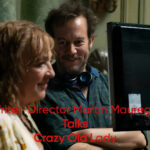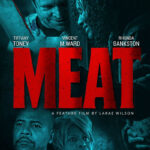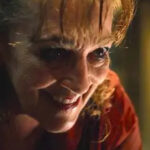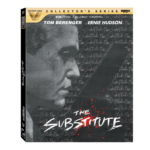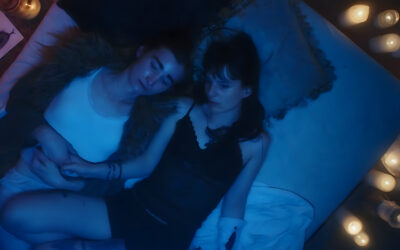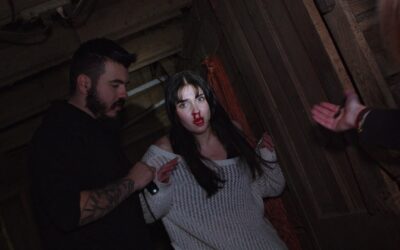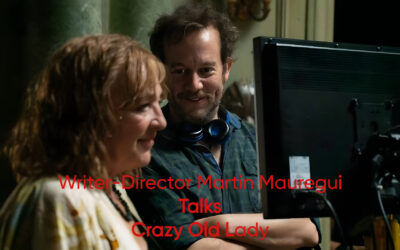
One of the best films to come of the horror genre this year is writer-director Keith Thomas‘ feature film debut, The Vigil, starring Dave Davis. I had the opportunity to speak with both Thomas and Davis, so of course, I jumped at the chance.

Writer-Director Keith Thomas
The Vigil (review), which I am more than a little fond of, centers on Davis’ character Yakov who is in a bad place, he’s struggling after leaving the Jewish Orthodox church and trying to cope with enormous guilt. Broke and desperate, Yokov agrees to sit shiva for a family overnight. As if things weren’t bad enough for the poor guy, an evil entity is lurking inside the house.
HorrorFuel: “I’m always fascinated by where the ideas and stories come from for movies. What inspired you to write The Vigil, which is fantastic by the way.”
Keith Thomas: “Wow. Well, it’s kind of a two-fold answer. One aspect of it was mercenary, in that I wanted to make a feature film, I knew that it was going to be my first. I had to come up with an angle that felt fresh and different but was also personal. You have to write what you know, so when it came time for me to do it I thought that if I was going to do a horror film that feels different and original I needed to do something I personally know. I asked myself what I knew that a lot of people don’t. I hadn’t seen a truly Jewish horror film that dealt with Jewish mythology. That was the setup. I’m going to give people a genuinely Jewish horror film. From there it came to, okay, what could we do? That’s when I decided on the Shomer aspect. I hadn’t seen a film that dealt with a Shomer in terms of the act of watching the body. It seemed like a perfect setup for a horror movie. When those two things came together, I thought it was perfect for a film.”
HorrorFuel: “It definitely is a great, unique movie. When I see fresh ideas like that, well, it makes the horror fan in me gets very happy.
One of the things I really appreciate about The Vigil is that around the third time I watched it I was walking out of the room to do something and I could only hear the movie. It hit me like a ton of bricks that the sound was so intense, almost like a character in itself. I guess when your brain is concentrating on the screen the sound sort of melts into the background but it really does help mold the film. Can you tell us about that?
Keith Thomas: “Yes. Thank you. It was really important to me that the sound design play a huge role. Being a horror fan myself, I have noticed just how effective the scares are and the creepiness and uneasiness are if the sound design is doing a lot of the work. But it also just came from moments – it’s funny when you sit down to write a script you have to put yourself into a place where you are trying to scare yourself. Scares are really subjective, right. It’s just like comedy. Some people say a guy slipping on a banana peel is like the height of humor and other people think it comes from witty, dry British humor. Scares are the same way. Some people think that a very visceral jumpscare is like the most terrifying thing and other people think it’s something psychological. The one thing that all of those things have in common is the sound. It was really important for me to make the sound design a crucial component of it. I knew in the very beginning that it would be fifty percent of the movie. I wrote the sound design into the script and tried to get as much in there as possible, hat sounds to be associated with the house, what’s real, and what’s not real. We had sounds like the clock and ones that we manufactured. I had hundreds of files of sounds. Then it came time to work on the score. I always like films that the score works in harmony with sound.”
HorrorFuel: “The sound does make so much of an impact. What was production like? Was there a part of the film that was more difficult than the rest of the scenes?
Keith Thomas: “For me, everything with Dave was amazing and wonderful, and we got what we wanted. Most of the production went really well. There are no cut scenes, everything we shot is in the movie. There’s no extra footage out there. But in terms of the most challenging scene was creative rather than production-based, there was the opening scene that takes place during the holocaust. When we came up with the idea that we were going to have these flashbacks to the holocaust, my first reaction was that it was impossible. You can’t film it. Anything you’re going to film would be cheap compared to the experience. I was trying to think through how to show it in a way that was going to be authentic to the experience. In a sense, you’re trying to take things that are so horrible that they can’t be reduced to words. Just coming up with how we were going to show that was the biggest challenge for me. I couldn’t show a camp during the holocaust, we filmed in New Jersey. It had to be auditory and it had to be hallucinogenic in a way and it had to be very focused. It was twenty seconds of one person’s life shot through an ambiguous atmosphere. You are trying to capture the feeling of what is happening there. In a lot of ways traumatic incidents, when something traumatic happens, you’re not necessarily aware of what’s happening when it’s happening. All of the trauma comes later in your memories. I find that thing kind of becomes warped. the most difficult part for me was how to show the holocaust in a way that’s going to be pregnant with that emotion.”
Dave Davis: “I’ve said it before, this was my most difficult performance since I played Hamlet. Not only is it an incredible amount of technical challenges with multiple languages and with the regular challenges that come with independent film and filming in New York in the winter, but there’s also an element of joy and fun in working through it. So it would be hard to pick one scene that was the most difficult. For me, it was probably letting go of it all after it was said and done. It had become so ingrained over that month and a half. We had worked so hard to delve into this story that shaking it off kind of took on a different life. I think in a way, I had PTSD for a little while after filming. I don’t know if I really recovered from it until after I saw the film for the first time. With trauma, it’s how you process it. Later, the memories and understanding, and seeing the film it all came flooding back.”
Keith Thomas: Seeing the film, I was flooded by emotion. It was a very difficult project, and for that reason, it’s one of the most rewarding.
HorrorFuel: “I imagine that the holocaust scene would be difficult to capture. I think the way you chose to film it was a good decision. I can only imagine what you would go through filming something dark like this, both practically and emotionally. But I’m glad you did it. The Vigil is really a great film.
I love how all of the elements from the acting, the cinematography, sound, the demon, and even the shadows combine to bring you into that world. And I’m glad that you took the route of “sometimes less is more.”
Keith Thomas: “For me, that was a big thing. I think a lot of people learned from Jaws. When they first filmed Jaws that showed a lot of the shark. It was in the edit that they cut the shark out of most of the movie because the shark didn’t look as good as they had hoped. They ended up hiding the shark in most of it, hiding it in the shadows and it ended up making it better. How do you let the audience create something that’s going to be even scarier than what you can show them? It’s also funny that there is one particular scene in the film where the entity that’s in the movie is actually in the background. He’s standing right there, but I doubt that anyone sees it. He’s in the scenes that you don’t even realize he’s there.”
HorrorFuel: “I love little hidden things like that. I’m going to have to go back and try to find it.
The design for the entity is great, it’s simple but very twisted. Can you explain the design and making of it and any changes you made from its mythology?”
Keith Thomas: “The demon at the center of this film is a real demon in the sense that it exists in ancient Jewish writings. It’s called a Mazzik, which means destroyer in Hebrew. In the text that I dug up while looking for what this thing would be, all it says is you shouldn’t go into abandoned houses because there could be a Mazzik in them and you don’t want to run into one of those. There was no description of what it would look like, so when it came to time to actually make the thing, it was important to me for it not to look like your standard kind of boogeyman, that it had some kind of link to the themes of the film. For me, if a big part of the film was trauma, and how to let go and stop living in the past then this thing should be the embodiment of all ways looking backward, of never looking forward and never moving on. So that became part of the design. So how do you make that physically? That’s how the design of the thing came about. The other trick with horror films is how much do you show? What do you show? It’s scarier of course when people are only getting glimpses of it. Both showing for the big reveal – you have to show the thing eventually – but at the same time keeping ambiguous enough that the audience can kind of write onto the thing in terms of what they think they are seeing.
Dave Davis: “I will add to that. I hadn’t seen it at all. I had this image of it and then one day when I showed up on set, and I finally got to see what Keith and the team had been working on I got a glimpse of it and it was terrifying. So sometimes actually getting to see it is terrifying also [laughter].

Actor Dave Davis as Yakov Ronen
HorrorFuel: “Right! That thing is creepy!
How has making this film and the whole process affect you both?”
Keith Thomas: “For me, I would say it has changed me in a few ways. For one, it was just a great experience to watch something out of my head and onto paper then come to life. In a way that was both very encouraging and showed the power of collaboration. You can think of one thing and think you’ve got it right, but it’s not until you’re working with a lot of people who share the same passion for it that you realize the true extent of what things can be and how it grows from there. It was an important lesson for me, I think in terms of how you realize something and the potential it could have. You go in thinking one way and if you’re open to it and collaborate you get to another level.
Dave Davis: “I have a whole new appreciation after this project. Between delving into a character who has been through so much and learning about a community that has been through so much, and meeting so many wonderful people who have to on their own daily basis have their own relationship with their family in a way that makes it hard to make sense in regards to my own faith and understanding of community. The courage that I learned from the character of Yokov had a lasting effect on me.”
HorrorFuel: “The whole film revolves around the Jewish faith, may I ask, are you both Jewish?
Keith Thomas and Dave Davis simultaneously: “Yes we are.”
HorrorFuel: “I guess you both had to have the level of knowledge of the faith it would take to do this film right. And I think you did. I have Jewish heritage myself.
What message are you hoping viewers will take away from The Vigil, besides being scared silly?”
Keith Thomas: “For me, I think it’s about the whole theme of trauma and how you move through it. I think the takeaway I want to leave people with is the dark night of the soul, this guy is going through a thing that I think all of us have, our own dark night of the soul. The lesson for me is that you have to move forward.”
Dave Davis: “I hope that this movie will make people feel represented. I hope that it will give people a great sense of understanding of a community that they might not have known anything about. Or maybe there’s someone like yourself who has Jewish heritage who may or may not know about this particular community in Brooklin. I really hope that it will bring light to people who are our fellow Americans and will make those people together and the people that they share their space with.
HorrorFuel: “Dave, your character Yokov is quite emotional. He’s going through a tremendously hard time. Where did you draw from for that?
Dave Davis: “To build the character of Yakov I first wanted to understand the community that he came from. So I spent a lot of time researching the Jewish community and of having one foot in or out of the community or being a part of it, or having left the community, or trying to leave it and what that entails that many people go through, myself included. I tried to delve into the loneliness associated with giving up a life to find a new life and to really understand the courage that Yokov needed to take such a bold step and to take the journey of discovering who he really is. That’s a journey he had to take and one I had to take to better understand him.
When we were filming, I spent a lot of time alone and the apartment I was staying in, which was sparsely furnished, gave me time and space to work on my dialect and the role and to learn the script, but to also sit in that loneliness to try to understand what Yokov was going through. I think that a lot of times when people find themselves alone they seek to fill that space with music, or with television, or with films. They want to distract themselves one way or another. Yakov is in this house surrounded by his demons and the things in his community that he needs to confront – the ticking of the clock grinding in his ears, so I tried to recreate that and really live in that loneliness. What does someone hear when there’s nothing to hear? What does the ticking of that clock mean to you? When you’re an actor and you don’t have another actor to work with all of the time we are forced to listen to ourselves. I tried not to embrace it and not run from those fears, to foster them, to use them.
I said it in my review and I’ll say it again, The Vigil is a must-see! Both director Keith Thomas and Dave Davis did an absolutely fantastic job of bringing this unique story to life. I can’t wait to see what these two make next! Luckily, The Vigil lands on Digital and VOD on February 26, 2021, from IFC Midnight. Grab some popcorn, turn off the lights and watch one of the best horror films of the year!
